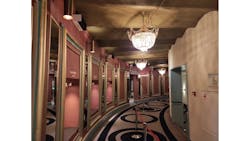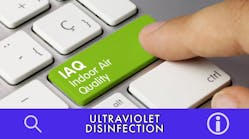Signify outfits two Dutch theaters with UV-C to fight coronavirus
Signify has hit another early mile marker in its marathon effort to establish ultraviolet as a weapon in the fight against the coronavirus, as two Dutch theaters have committed to using the company's ultraviolet C-band (UV-C) luminaires to facilitate hygiene conditions.
Amsterdam's Royal Theater Carré installed 75 Philips-branded, upper-air UV-C disinfection luminaires in its foyer as well as in dressing rooms and offices. The installation took about a month to complete in April and May, and the luminaires are now operating.
The Theater de Ruchte in Someren, Holland is in the process of installing around 20 upper air UV-C luminaires in the foyer, hallways, and meeting rooms, having already piloted a “handful” of them in meeting rooms and offices, Signify said.
Neither theater opted to install the technology in their performance halls.
Holland recently reopened cultural venues while applying a 1.5-m distancing guideline to lessen the risk of people spreading the SARS-CoV-2 virus that causes COVID-19.
The two theaters hope that their deployment of UV-C luminaires will further mitigate COVID health hazards. UV-C has been proven to deactivate the coronavirus at certain doses. Signify offers a 254-nm version (UV-C spans from 100–280 nm and is the shortest-wavelength ultraviolet band), using conventional mercury vapor lamps rather than LEDs.
"We are just as happy as our guests and performers to be open again," said Thomas Groen, Royal Theater Carré's manager of sales and partnerships. "Among other measures, these UV-C luminaires will minimize the risk of infection for our guests, performers, and our colleagues."
Theater de Ruchte general manager Tim Rijper echoed those remarks. "We want to do everything to welcome back our guests, performers, and employees as safely as possible, also post-COVID-19," he said. Someren, where the theater is located, is down the road from Signify's Eindhoven headquarters in the south of the country. Signify declined to reveal how much the theaters paid.
Other theaters have also deployed UV-C germicidal systems. In Spain, for example, Madrid’s Teatro Real opera house and Toledo’s Teatro Rojas performance venue are using different UV-C devices, supplied by China's Goldenseas, which is believed to use Signify goods on an OEM basis.
But in general, uptake of UV-C technology by commercial enterprises appears to be proceeding at a slower pace than the industry would like. Signify CEO Eric Rondolat in May described the business as “less of a sprint, and more of a marathon.” In the ongoing early stage, the long race has included a number of UV-C projects such as at German supermarket Edeka, Dutch soccer team PSV Eindhoven, German soccer team RB Leipzig, and London rugby team Harlequins, among others.
One vendor, Orlando, FL-based Healthe, recently tapped a branding expert as its new CEO in an effort to stimulate UV-C sanitization as a product category targeting not just the coronavirus but other pathogens as well as the public becomes more hygiene-aware. In Healthe's case, the recent addition to its ownership ranks of property executive Stephen Ross — chairman of real estate giant Related Companies — could help open doors to UV-C projects. Healthe emphasizes a category of UV-C known as far UV-C.
Editor's note: In our forthcoming July/August issue Special Report, chief editor Maury Wright explores the status of germicidal UV (GUV) systems in commercial & industrial applications, plus the prospects for LEDs in a UV-C future in his issue column. Subscribe to get magazine alerts delivered to your inbox.
MARK HALPER is a contributing editor for LEDs Magazine, and an energy, technology, and business journalist ([email protected]).
For up-to-the-minute LED and SSL updates, why not follow us on Twitter? You’ll find curated content and commentary, as well as information on industry events, webcasts, and surveys on our LinkedIn Company Page and our Facebook page.

Mark Halper | Contributing Editor, LEDs Magazine, and Business/Energy/Technology Journalist
Mark Halper is a freelance business, technology, and science journalist who covers everything from media moguls to subatomic particles. Halper has written from locations around the world for TIME Magazine, Fortune, Forbes, the New York Times, the Financial Times, the Guardian, CBS, Wired, and many others. A US citizen living in Britain, he cut his journalism teeth cutting and pasting copy for an English-language daily newspaper in Mexico City. Halper has a BA in history from Cornell University.




![The DesignLights Consortium continues to make progress in shifting outdoor lighting products and implementation practices toward a more restrained and thoughtful strategy. [Image does not represent a DLC qualified fixture.] The DesignLights Consortium continues to make progress in shifting outdoor lighting products and implementation practices toward a more restrained and thoughtful strategy. [Image does not represent a DLC qualified fixture.]](https://img.ledsmagazine.com/files/base/ebm/leds/image/2024/08/66be810888ae93f656446f61-dreamstime_m_265700653.png?auto=format,compress&fit=&q=45&h=139&height=139&w=250&width=250)
